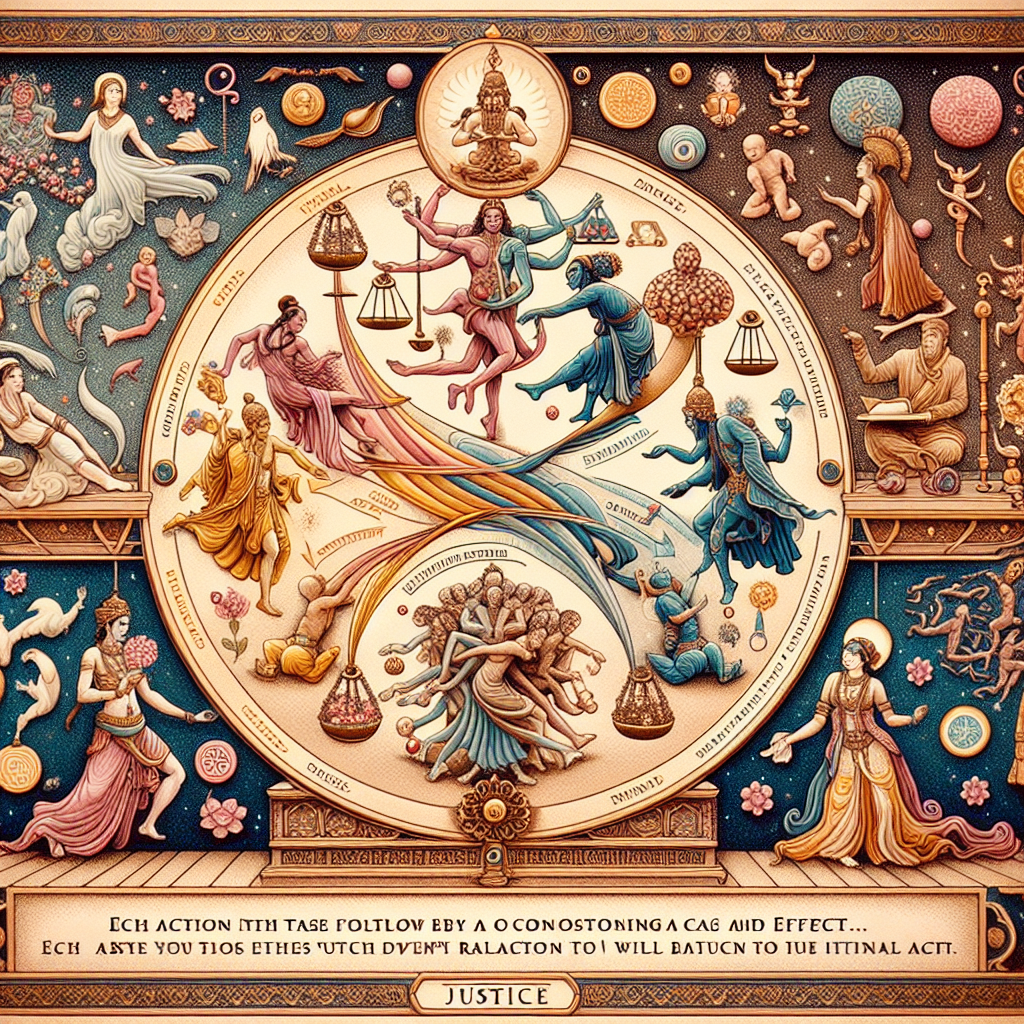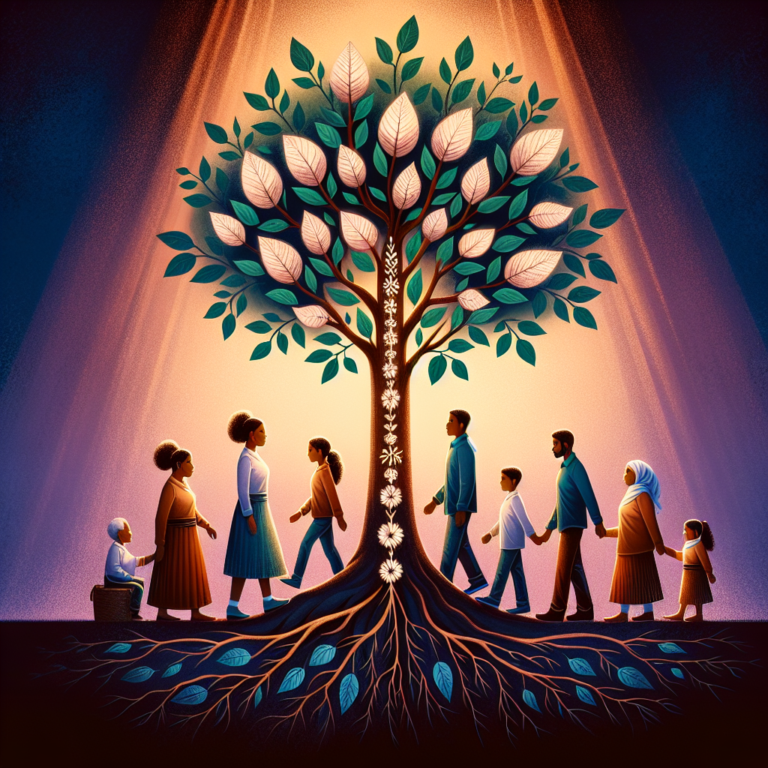Karma, a term rooted in ancient philosophies, primarily within Hinduism and Buddhism, evokes a spiritual and moral perspective of life where actions have consequences. It is often simplified to the notion that “what goes around comes around.” However, the complexity of karma encompasses much more than mere retribution; it serves as a fundamental principle governing human behavior and the universe’s moral fabric.
The Origin of Karma
The concept of karma originates from the ancient Sanskrit word “karman,” which means “action” or “deed.” In Indian philosophy, every action is not only a physical deed but also a thought or intention that sets forth a cause-and-effect chain. This belief posits that the moral quality of one’s actions—whether positive or negative—embeds itself in one’s future experiences and incarnations.
The ancient texts of the Vedas, Upanishads, and the Bhagavad Gita expand on this principle, teaching that karma transcends individual lifetimes and continues across multiple reincarnations. This cyclical journey of the soul emphasizes personal responsibility and encourages individuals to act in harmony with dharma—the moral order of the universe.
The Types of Karma
Karma is often categorized into three primary types: Sanchita, Prarabdha, and Agami, each representing a different dimension of action and consequence.
Sanchita Karma
Sanchita karma refers to the accumulated karma from all past actions, both good and bad, which remains in a dormant state. It can be thought of as a reservoir of potential experiences and outcomes that an individual has created throughout their existence. This concept highlights the importance of our past actions, which shape our current life circumstances.
Prarabdha Karma
Prarabdha karma is a segment of Sanchita karma that has begun to manifest in the present life. It represents those actions that are ripe for fruition and hence dictate much of our current experiences, challenges, and rewards. Understanding Prarabdha karma can offer insights into why certain situations are unavoidable and how they serve as catalysts for personal growth.
Agami Karma
Agami karma is the karma that is being created in the present moment, through current thoughts, intentions, and actions. This dynamic aspect emphasizes that while we are influenced by past actions, we are not powerless; we can alter our future through our current choices. The realization that we are constantly shaping our destiny can empower individuals to make more conscious decisions.
The Spiritual Dimension of Karma
Exploring the spiritual implications of karma reveals a deeper understanding of human existence. In many philosophical traditions, karma is intricately tied to the concepts of spiritual evolution and enlightenment.
In Buddhism, for instance, karma is associated with the cycle of birth, death, and rebirth (samsara). The ultimate goal is to attain Nirvana, a state beyond the cycle, free from the repercussions of karma. This path necessitates mindfulness and the cultivation of compassion—actions that generate positive karma not only for oneself but for all beings.
The spiritual journey emphasizes the transformation of one’s inner self. Each action carried out with love, kindness, and integrity contributes to a more profound understanding of interconnectedness, leading practitioners closer to enlightenment and personal liberation.
Karma and Modern Psychology
The principles of karma resonate with several concepts in modern psychology, particularly in the realms of behavior and consequence. The idea that our actions have repercussions aligns with the behavioral approach, where responses to environmental stimuli shape future behaviors.
Cognitive Behavioral Therapy (CBT) also echoes the karmic principle by asserting that our thoughts can influence our feelings and behaviors. By changing detrimental thought patterns, individuals can modify their actions and subsequently alter the outcomes in their lives, reflecting the essence of Agami karma.
Furthermore, the practice of mindfulness—central to many spiritual traditions and increasingly adopted in psychological therapies—encourages present-moment awareness and intentional action. This awareness fosters the recognition of how each choice contributes to the narrative of one’s life and the impact it has on others.
Karma’s Role in Relationships
Relationships serve as a fertile ground for understanding and practicing karma. The dynamics between people can reveal intricate patterns of cause and effect, fostering growth and self-awareness. Actions taken within relationships—whether loving, hurtful, supportive, or neglectful—create ripples that affect not only personal interactions but also the broader community.
The notion of “karmic relationships” often arises in discussions about intense, transformative connections where individuals seem drawn together for a specific purpose. These relationships may illuminate unresolved past issues, trigger personal growth, and teach valuable lessons. Understanding the karmic influence in relationships encourages individuals to navigate interactions with empathy and awareness, recognizing that every action can impact another’s journey.
Addressing Misconceptions About Karma
Misunderstandings about karma can lead to misguided beliefs and practices. One common misconception is the idea of karma as a strict system of punishment and reward—a simplistic view that can distort the profound nature of karmic principles.
Another misconception is the notion of fatalism, where individuals believe that their present circumstances are predetermined and unchangeable due to past actions. While past karma does influence present situations, the practice of moral agency through current actions highlights the dynamic nature of karma, inviting individuals to take proactive steps in shaping their future.
Moreover, karma is sometimes viewed as a transactional system, where individuals expect good deeds to lead to immediate positive outcomes. Still, karma operates in a more nuanced and expansive way—results may not be immediate, and the effects of negative actions can manifest differently than initially anticipated. This misunderstanding can lead to disillusionment when expected outcomes do not materialize in the expected timelines.
Karma and Ethical Living
The concept of karma inherently calls for ethical living and consciousness in daily actions. Understanding that our behavior does not exist in isolation encourages individuals to ponder the broader impact of their choices. This mindfulness can cultivate a sense of responsibility towards others and foster a commitment to positive actions.
Ethical frameworks across various philosophies emphasize principles such as compassion, integrity, and justice. Practicing these values aligns with the karmic belief that ethical actions not only contribute to personal well-being but also create a harmonious society. Through community engagement, advocacy for social justice, and environmental stewardship, individuals can actively participate in generating positive karma that transcends self-interest.
Conclusion
The intricate dance of karma—interwoven with the principles of cause and effect—provides profound insights into the human experience. By acknowledging the continuity of actions and their consequences, individuals are empowered to recognize the role of personal agency in shaping their destinies. The beauty of karma lies in its transformative potential; it invites us to cultivate compassion and mindfulness to contribute positively to our lives and those of others.
Embracing the lessons of karma encourages ethical living and self-reflection, reminding us that each decision has the power to ripple through the fabric of existence. As we explore the depths of our actions and their repercussions, we awaken to the interconnectedness of life, fueling our journey towards greater understanding, growth, and fulfillment.
FAQs
What is karma?
Karma is a concept that emphasizes the law of cause and effect regarding actions and their consequences. It suggests that every action, whether positive or negative, influences future outcomes and experiences.
Does karma only apply in this lifetime?
In many traditions, karma is viewed as a continuous process that spans across multiple lifetimes. Past actions influence current experiences, but current actions also shape future outcomes.
Can I change my karma?
Yes, individuals can change their karma through conscious choices and actions in the present moment. Positive intentions and ethical actions can generate favorable outcomes.
Is karma the same as fate?
While fate implies predetermination, karma emphasizes personal agency and the ability to shape one’s life through actions. Karma recognizes that while past actions influence present circumstances, individuals have the power to create new outcomes.
How can I create positive karma?
To create positive karma, engage in acts of kindness, compassion, and understanding. Mindfulness of your thoughts and actions can help you make choices that reflect your values and contribute positively to others and the world.
, It looks like you want to start a new topic or receive a specific type of content. Could you please provide more details or specify what you’re looking for? Whether it’s a story, information, advice, or anything else, I’m here to help!, #Karma #Unveiled #Intricate #Dance #Effect, #Karma #Unveiled #Intricate #Dance #Effect, 1734035920, karma-unveiled-the-intricate-dance-of-cause-and-effect





